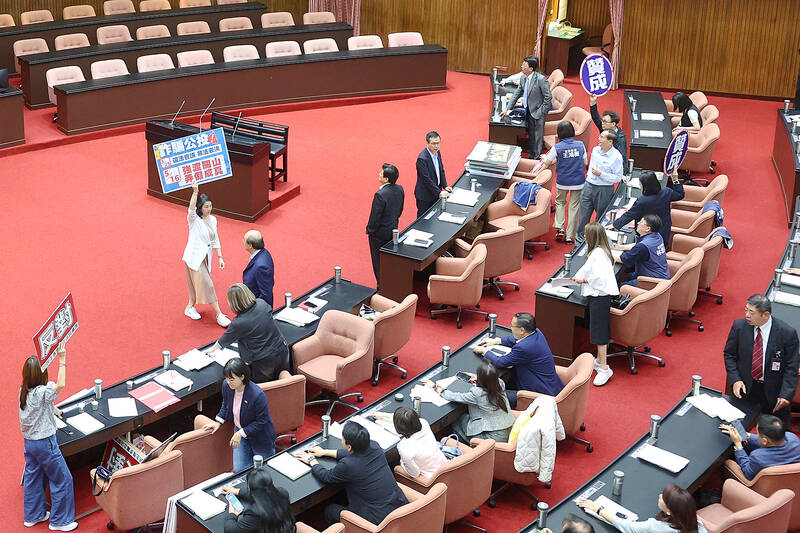The Legislative Yuan yesterday passed the Chinese Nationalist Party (KMT)-proposed referendum opposing the abolition of the death penalty, with a 54:48 vote.
The bill yesterday questioned the legality of all courts across different circuits having to reach a unanimous decision in a capital sentence ruling, stating that Constitutional Judgement No. 8 last year ruled that capital punishment was constitutional, but imposed strict and unreasonable prerequisites for such a ruling, so it was as though capital punishment existed only in name.
The judgement places the preferences of the grand justices above public opinion, the KMT said.

Photo: CNA
Despite the execution of death-row inmate Huang Lin-kai (黃麟凱) on Jan. 16, the public is not convinced that the death penalty has not in effect been abolished, it added.
Huang, then an active service military personnel, was convicted of the murder of his ex-girlfriend Wang Pin-chih (王品智) and her mother, Chou Mei-chueh (周美雀), in 2013, and was given the death penalty.
The bill was introduced by KMT Legislator Wu Tsung-hsien (吳宗憲) on March 25. The vote yesterday was held after a consensus was not reached in a cross-caucus meeting convened by Legislative Speaker Han Kuo-yu (韓國瑜) on May 8.
Before the vote took place, Democratic Progressive Party (DPP) lawmakers took the podium and voiced their opposition to the bill.
DPP caucus chief executive Rosalia Wu (吳思瑤) said that any referendum motion initiated by the legislature has to abide by existing policies governing the drafting and amendment of laws and policies.
As Taiwan has not officially abolished capital punishment, and the Constitutional Court has declared that the death sentence is constitutional, Wu questioned the legal knowledge and literacy of opposition lawmakers.
The KMT’s motion was a waste of taxpayers’ money and was an attempt to sidetrack the recall efforts against KMT legislators, she said.
DPP Legislator Chung Chia-pin (鍾佳濱) said the KMT’s proposed bill capitalized on the public’s lack of knowledge on the issue and incites them to upend the Constitution.
According to the Referendum Act (公民投票法), the legislature can propose a referendum bill, along with its reasoning, if it finds that important policies should be drafted or amended.
If passed, the referendum should be forwarded to the competent authorities within 10 days of the bill’s passage, the act states.

NATIONAL SECURITY THREAT: An official said that Guan Guan’s comments had gone beyond the threshold of free speech, as she advocated for the destruction of the ROC China-born media influencer Guan Guan’s (關關) residency permit has been revoked for repeatedly posting pro-China content that threatens national security, the National Immigration Agency said yesterday. Guan Guan has said many controversial things in her videos posted to Douyin (抖音), including “the red flag will soon be painted all over Taiwan” and “Taiwan is an inseparable part of China,” while expressing hope for expedited “reunification.” The agency received multiple reports alleging that Guan Guan had advocated for armed reunification last year. After investigating, the agency last month issued a notice requiring her to appear and account for her actions. Guan Guan appeared as required,

A Vietnamese migrant worker yesterday won NT$12 million (US$379,627) on a Lunar New Year scratch card in Kaohsiung as part of Taiwan Lottery Co’s (台灣彩券) “NT$12 Million Grand Fortune” (1200萬大吉利) game. The man was the first top-prize winner of the new game launched on Jan. 6 to mark the Lunar New Year. Three Vietnamese migrant workers visited a Taiwan Lottery shop on Xinyue Street in Kaohsiung’s Gangshan District (崗山), a store representative said. The player bought multiple tickets and, after winning nothing, held the final lottery ticket in one hand and rubbed the store’s statue of the Maitreya Buddha’s belly with the other,

‘NATO-PLUS’: ‘Our strategic partners in the Indo-Pacific are facing increasing aggression by the Chinese Communist Party,’ US Representative Rob Wittman said The US House of Representatives on Monday released its version of the Consolidated Appropriations Act, which includes US$1.15 billion to support security cooperation with Taiwan. The omnibus act, covering US$1.2 trillion of spending, allocates US$1 billion for the Taiwan Security Cooperation Initiative, as well as US$150 million for the replacement of defense articles and reimbursement of defense services provided to Taiwan. The fund allocations were based on the US National Defense Authorization Act for fiscal 2026 that was passed by the US Congress last month and authorized up to US$1 billion to the US Defense Security Cooperation Agency in support of the

CLASSIFIED BRIEFING: The ministry said the special budget focuses on building a comprehensive defense system and strengthening the domestic defense industry The Ministry of National Defense yesterday released information on seven categories of weapons systems to be procured under a stalled NT$1.25 trillion (US$39.57 billion) special defense budget, including precision artillery, long-range missiles, air defense anti-tank missiles and more than 200,000 uncrewed aerial vehicles (UAVs). The Executive Yuan approved a draft version of the budget on Nov. 27 last year and submitted it to the legislature for review. The legislature’s Foreign Affairs and National Defense Committee yesterday invited Minister of National Defense Wellington Koo (顧立雄) to deliver a classified briefing and answer questions at a closed-door session. Koo said he hoped to provide lawmakers